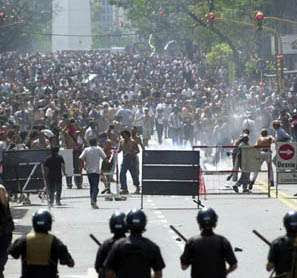Argentina's government tried to fix all of this. It did ok for a while, but also had other problems. Corruption was a big problem. Important people in the government would make business deals for Argentina that would get a few people rich while hurting the country. Unemployment was also on the rise. All of this created an economy that was not very stable. Things got worse at the end of the 1990s. Argentina had all these debts it could not pay because it was not making enough money, corruption was terrible, and people were getting frustrated. They were scared and starting going to the banks to take out all their money so that they did not lose it. The government knew that this would not be good and placed limits on how much money could take out. People got mad and started to riot all over the country. They broke stores open, stole food, protested everywhere, and fought with the police.


 Five presidents ruled the nation in a span of two weeks (see "Five Presidents in Two Weeks" below). One after another kept resigning until one, Eduardo Duhalde [ed-wuar-doh doo-wual-day], stayed for over a year and helped stabilize the situation after it got even worse in 2002. In 2002, prices went up for everything, but wages stayed the same and unemployment was still a huge problem. However, the 2003 election brought in Néstor Kirchner [nest-ore keerch-ner]. He has helped pay off the debts, stop inflation, promote growth, and help unemployment. Things have been better for Argentina since 2002 and there is still much work to be done. Yet this crisis has made many Argentines upset and bitter. A part of Argentina's culture is pessimism, especially in politicians. They want their government to do a better job at taking advantage of Argentina's rich natural resources and incredible potential for growth.
Five presidents ruled the nation in a span of two weeks (see "Five Presidents in Two Weeks" below). One after another kept resigning until one, Eduardo Duhalde [ed-wuar-doh doo-wual-day], stayed for over a year and helped stabilize the situation after it got even worse in 2002. In 2002, prices went up for everything, but wages stayed the same and unemployment was still a huge problem. However, the 2003 election brought in Néstor Kirchner [nest-ore keerch-ner]. He has helped pay off the debts, stop inflation, promote growth, and help unemployment. Things have been better for Argentina since 2002 and there is still much work to be done. Yet this crisis has made many Argentines upset and bitter. A part of Argentina's culture is pessimism, especially in politicians. They want their government to do a better job at taking advantage of Argentina's rich natural resources and incredible potential for growth.

No comments:
Post a Comment